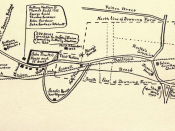In life, emotions can act as motivators for courses of action, particularly the feelings of fear, guilt and revenge. Arthur Miller's play The Crucible shows these themes put to use on a number of occasions. The play's numerous characters and relationships provide a plethora of examples where the themes are employed. It is through their actions that their emotions and motives are revealed, aiding us in understanding the measures they've taken.
Fear can drive people to actions of cowardice and dishonesty. Mary Warren displays this anxiety when she allows Abigail to frighten her into abandoning John Proctor and accusing him of witchcraft. This leaves him unable to prove the girls' perjury and at the mercy of the judges who are quick to impose guilt. Reverend Parris also displayed an influence by fear when he urged the judges to condemn the accused and encouraged the accused to confess. He believed that this would help him continue to appear moral in the town during immoral and unjust proceedings.
Should he lose his facade of morality, he would lose his position of power as reverend. Both Mary Warren and Parris threw others in the line of fire when they had the opportunity to help, proving the negative effects fear can have on people's judgment.
Guilt can pressure a good person to do the right thing, showing the potentially positive effects of an essentially negative sentiment. John Proctor wanted to confess to the charge of witchcraft and live. However, he chose not to confess and tarnish the names of the remaining accused. He knew the guilt of his confession would be too great a burden to live with. Revered Hale's guilt of condemning the innocent "witches"� to death was his main motivator in advocating Proctor's inclination to confess. Guilt can apply much strain on...


